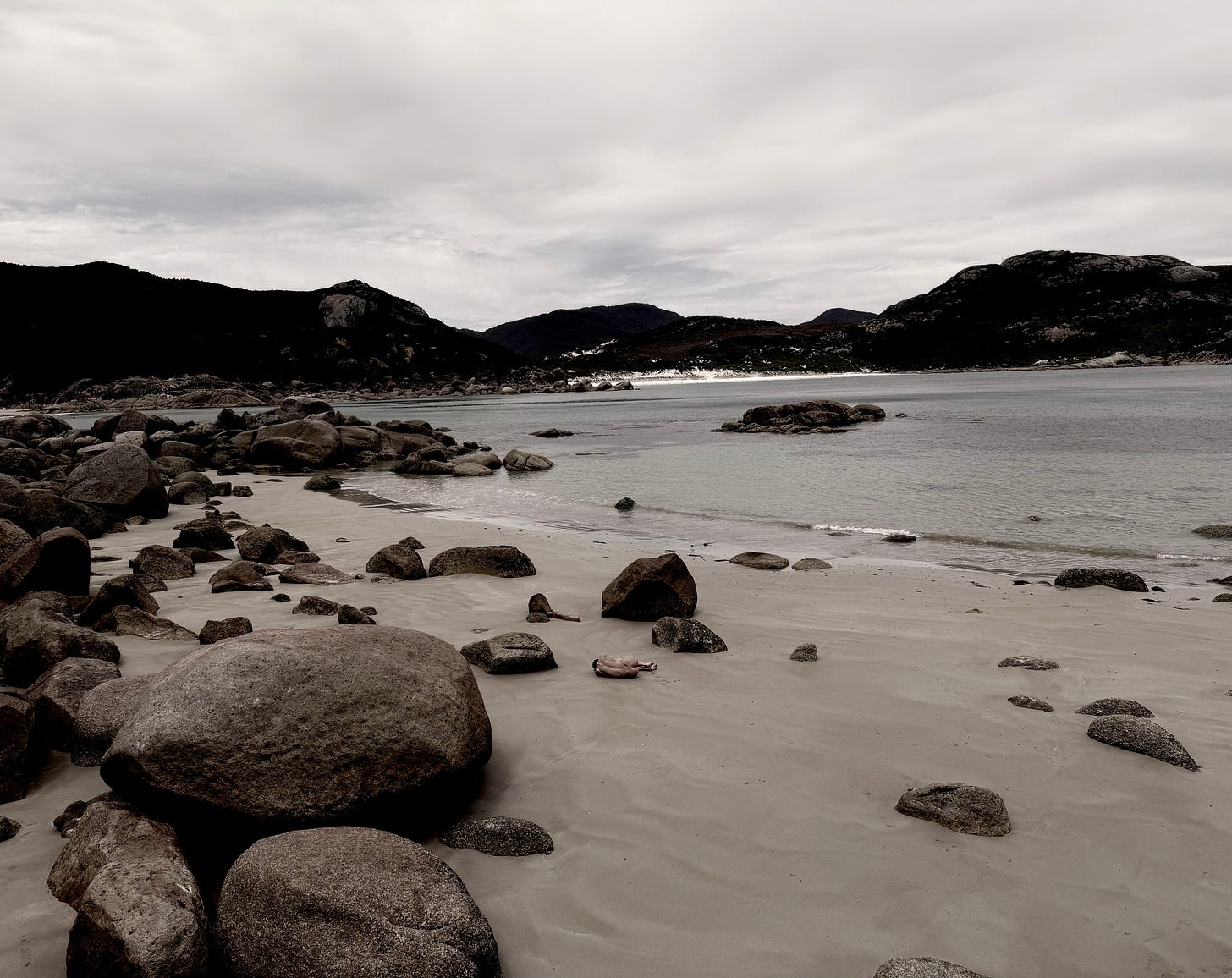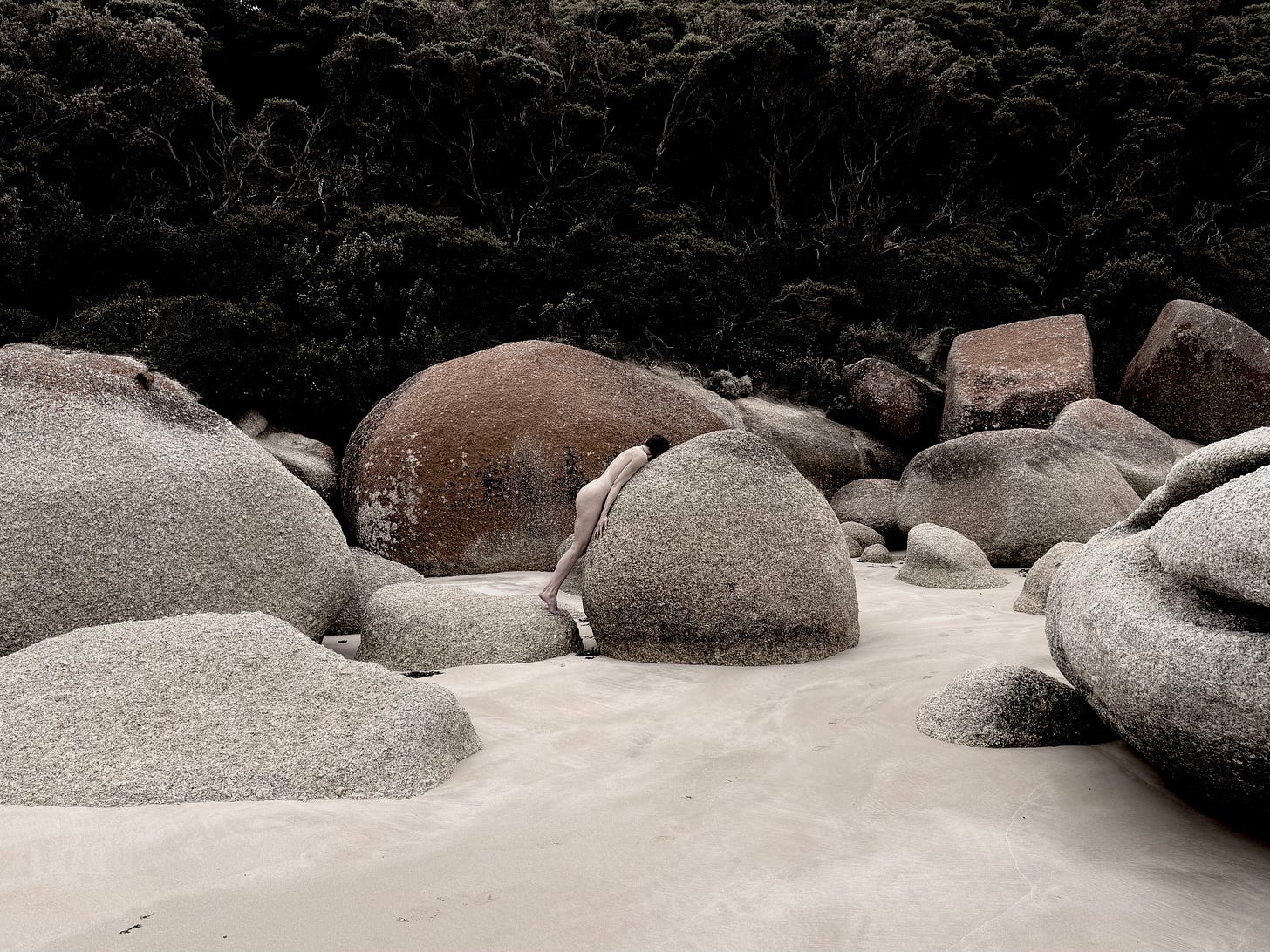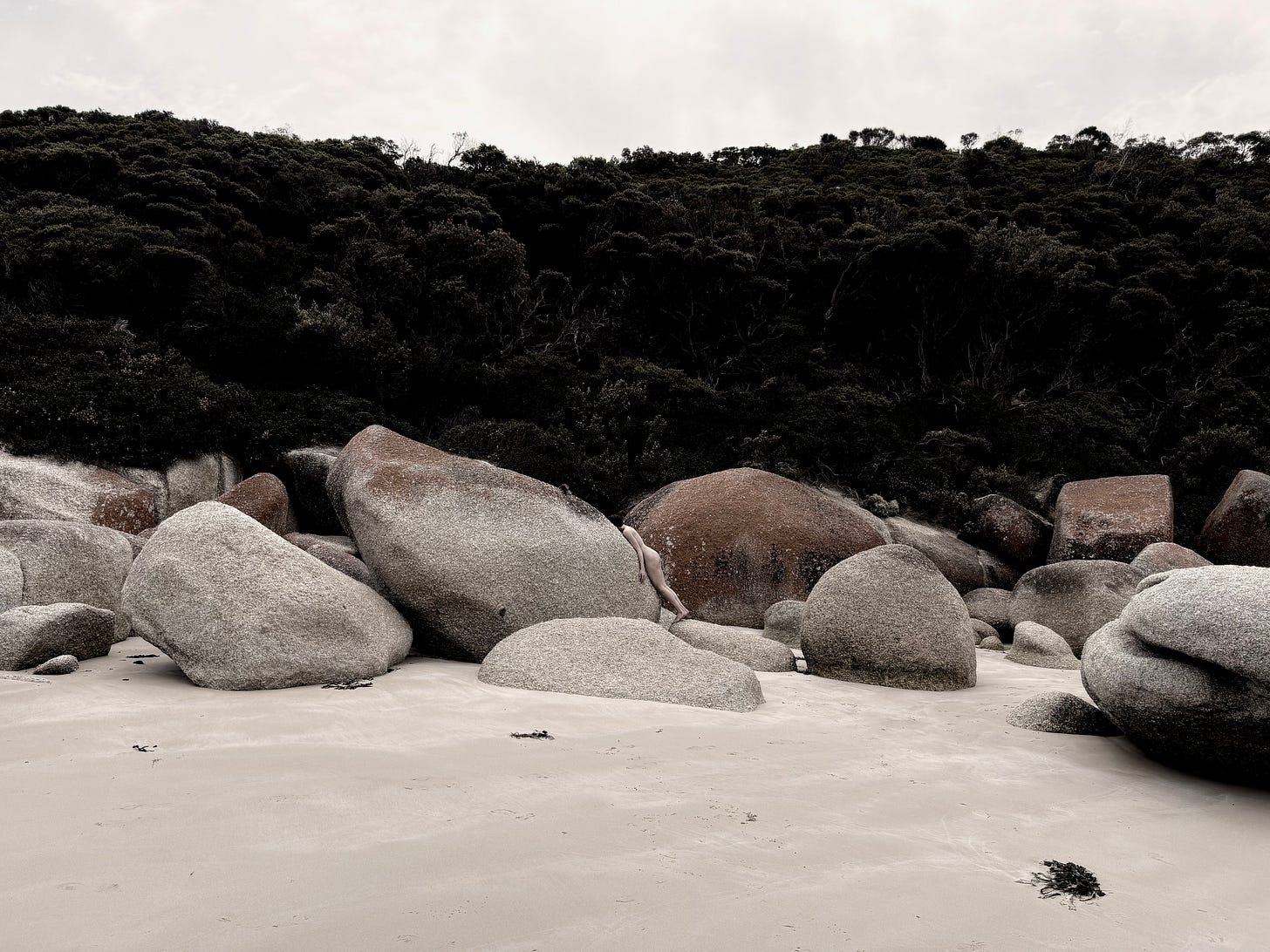This post is a reflection about my participation in our latest cycle around the sun (i.e. the 2024 calendar year).
I’ll start by defining some terms. I’ll then share a recent and relevant artistic project I worked on with my very versatile and talented partner. I’ll wrap up with some notes on the therapeutic potential of meta-cycling using CALM-MO (Henriques) and Philosophical Health (Miranda) as two specific (and for me, topical) ideas / approaches.
Let’s begin.
Key terms
Ouroboros is a gnostic and alchemical symbol expressing the unity of all things, material and spiritual, which never disappear but perpetually change form in an eternal cycle of destruction and re-creation. The name comes from the Greeks’, but the symbol likely originates in Ancient Egypt.
Meta here means self referential, after or beyond, and also ‘higher order’.
By cycling I am playing with the idea of moving your legs in a circular motion, but I really mean the cyclical phenomena we observe in ‘nature’ and ‘beyond’ (think nutrient cycling as one specific example). When I bring meta and cycling together, I mean ‘engaging above’ cycles of life and universal process so that you can enact higher order self / other / world awareness. In other words, I’m talking about becoming an effective meta-cognitive observer of the cycles themselves, along with their influence on you, you on them etc.
By medicine I refer to something that has therapeutic potential (ie it helps solve an acute problem or enhances the adaptive potential of a subject or system).
With that out of the way, let’s get to the crux (I’ll expand on these ideas in context).
Setting the scene
I’ve just spent the last five days near Wilson’s Promontory in Victoria, Australia with my partner, Esther.
Thanks to some exploring and quite adventurous climbing (yes, we are feeling it EVERYWHERE!!! Appreciate the folks at Northside Osteo for their post rock climbing assistance), we managed to make our way to a remote spot with nothing that resembled human beings or human structures.
It was truly incredible.

Through this process of truly playful and curious exploration, we also managed to create some art we immediately fell in love with.
This is the first time we’ve done a project like this together. I should be clear, however, that I am the novice in this equation. Esther has a lot of experience, both in front of, and behind the camera. Her work has featured all over, including VOGUE. Thankfully for me, she was patient and even afforded me the privilege of some creative direction.

Skipping what feels like plenty of potentially fun and useful context, here is what we produced:
Project Title: Ouroboros
Ouroboros expresses the unity of all things, material and spiritual, which never disappear but perpetually change form in an eternal cycle of destruction and re-creation. For thousands of years, this ‘reality’ has been known, respected and lived by diverse human cultures. However, for various reasons, we have progressively lost our deep connection to this truth. And unfortunately this brings about much suffering.
With this collection of 5 images, Esther Jasaraj and Nathan Kinch highlight how our disconnection from this natural cycle is not the end or some pre-determined destination, but rather an opportunity to return, reconnect and collectively enact the eternal wisdom of Ouroboros.
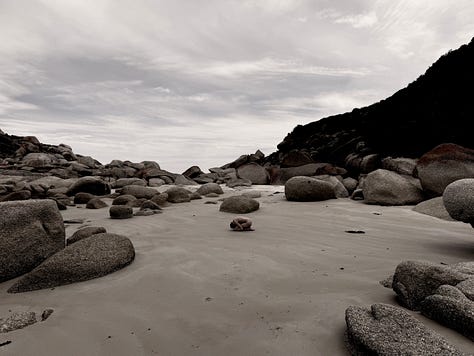
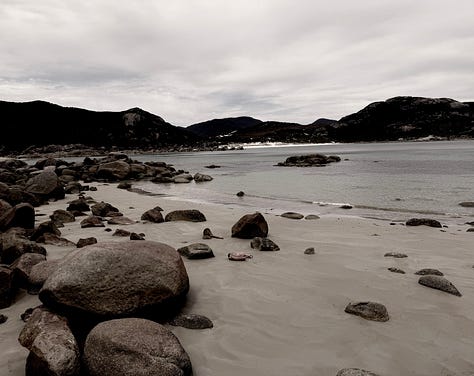
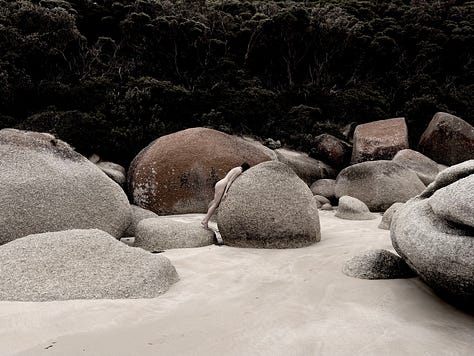


Image 1: Separation
Alone in a vast space, yet surrounded by ‘others’. Is this how it’s meant to be?
Image 2: Suffering
Fly, fight or… freeze. Why is this happening to me?
Image 3: Returning
Mother. Is this what home feels like? Earth.
Image 4: Reconnecting
Leaning into reality. Are you ready to move forward?
Image 5: Recycling
I am the snake.
Interpreting the Whole (or ‘Artist Notes’)
If it is true that matter is neither created nor destroyed, then we are expressions of the eternal cycle of destruction and re-creation. We are evolutionary processes tending towards greater complexification. In other words, we are perpetual change. We are Ouroboros, devouring ourselves in ways that (have the potential to) give rise to new, more adaptive ways of being, doing and becoming.
But how many of us live as if this is true? As far as we can tell the answer is very few of us.
Through experience we have learned that the stories we are told about our separateness are not completely true. Yes we are individuals. And yes our lives are entirely unique. And yes we have the capacity, as unique persons, to contribute uniquely to this world. But at the same time we are part of the whole. We are part of this world. We are active participants in the universe. We are all intimately intertwined in a process of inter-being and inter-becoming. We cannot, no matter how hard we try, actually separate from it or from each other.
This tension - between the stories we’ve internalised about our separation and the deeper relational reality of universal process - causes significant suffering. But it doesn’t have to be this way. It doesn’t. We can individuate - become who we are uniquely capable of being - in healthy relation to other people, non-human animals and the rest of the world we inhabit. It can be ‘this and’, rather than ‘this or’.
Waking up to Ouroboros is how we can transition from feeling lost, confused and alone, to feeling at home in ourselves, our place and our time, connected to what truly matters, and deeply capable of embracing the inevitability of perpetual change.
Here’s to eating your own tail.
**A brief note: Less than 24 hours after reviewing the images we had captured and really connecting with our frame (i.e. the snake eating itself, image 5), we met this beautiful fella.
I’m really proud to have participated in this. I’m grateful for the opportunity to join Esther in her artistic pursuits (she brings the perfect venn of joy, awe, curiosity, humility, playfulness and professionalism into the process, which makes your ‘job’ as anyone else on the project or campaign soooo much better). And I’m excited to see where our artistic collaborations may take us in the future.
With this as our backdrop, let me move towards the topic of how meta-cycling (higher order thinking about, above and beyond the processes and cycles we observe and participate in) has therapeutic potential (i.e. helps you live something closer to ‘the good life’). To do this I want to share two ideas / approaches that are directly relevant to embracing and healthily adapting to the perpetual cycles of change.
Approach 1: CALM-MO
Some of you will be familiar with Gregg Henriques meta-theoretical work on the Unified Theory of Knowledge. Within this deep, rich and consequential body of work is CALM-MO.
“CALM-MO is the eighth key idea in the UTOK. It is an integrative approach to psychological mindfulness that efficiently and effectively characterizes the key principles to foster healthy socio-emotional processes, both intrapsychically and interpersonally. Grounded in the Unified Metapsychology's model of human consciousness and relations, it orients individuals on cultivating the capacity to develop a "Meta-cognitive Observer" as their modus operandi when they get bumped by the vicissitudes of life. CALM is an acronym that stands for Curiosity, Acceptance, Loving Compassion, and Motivated toward Valued States of Being. The idea is to adopt a "CALM" attitude and orientation to one's body, mind, and spirit (defined in this system as one's orientation toward the ultimate concern).”
I highlight this specific component of Henriques’ work because it provides a clear and very useful way of relating to the complexity of some our experience as minded-animals and cultured-persons. Specifically, the ways in which we can better understand and be 'appropriately moved by’ our emotions (in other words, how we can respond to our emotions in ways that align to our values, rather than quickly reacting to them. I note, as you may have already, that sometimes the proper function of an emotion is to move us immediately. Think fear that arises in response to real, not just perceived danger. I’ll skip caveats and nuances for now).
By actively cultivating our capacity to be a meta-cognitive observer, we can begin to see patterns and possibilities unbeknownst to us. We can begin to tell more accurate stories about where we’ve come from, who we are and where we have the potential to go. We can begin more clearly seeing and experiencing the ‘truth’ of our reality
So even though this clearly has therapeutic potential (in terms of emotional adaptivity and overall biopsychosocial well-being), how does this relate to the mythology of Ouroboros (and whatever deeper truths may ground such a mythopoetic frame)?
Well, part of our capacity to accept and live the ‘cycle of perpetual change’ rests on our ability to develop a certain confidence in our abilities (basically self efficacy). If anger or sadness or guilt scare the heck out of you, it’s very likely you will engage in what ends up being maladaptive behaviours (unhealthily controlling, blaming or avoiding etc.). But, if you have a strong sense of what emotion is and what it does, you can start seeing emotion as a signal for self reflection and values aligned action. You can more confidently embrace the inevitable diversity and turbulence of human existence. You can go in, through and beyond, rather than running or hiding.
To get at this another way, if someone is fighting with the inevitability of change, they may well respond to ‘negative’ circumstances and the related ‘negative’ emotions with more fear, blame or pressure. This negative response to a negative emotion related to a negative event can become a neurotic loop of sorts. It limits one’s capacity to healthily embrace change and can lead to psychological suffering (a battle within one’s mind).
With a CALM-MO approach, there’s a very real chance that the same situation could be met with curiosity, acceptance, loving kindness and motivation towards valued states. Through this process, even if the circumstance and related emotions are very difficult, there’s an opportunity to learn and evolve for the better.
As one cultivates their capacity as a meta-cognitive observer, one’s ability to devour their own tail improves substantially ;)
Approach 2: Philosophical Health
For today, when I say ‘philosophy’ I mean a deep care / love for the process of wisdom seeking. By wisdom, I mean something like the ability to know, deeply care for, and live in close relation to what truly matters.
Over the years, many have suggested that this is something like an innately human process (as in, ‘doing philosophy’), the ‘emergence of which’ perhaps coincided (in what we might now think of as a very ‘basic way’. Although, whether this value judgement is appropriate in any sense is a different line of inquiry) with our capacity to self justify our behaviours in relational contexts (self narrating ego, verbal language etc.).
Therefore, for the purpose of this article, when I refer to philosophical health I am referring to a person, group, community, society or culture having a healthy overall relationship to the process (in an agent-arena type sense, meaning the individual has certain drives, desires etc. is grounded in community / culture that cares about the process, has ample opportunity to engage in the process, the broader environment is largely favourable etc.) of wisdom seeking.
Before moving on, I should note that this idea has a rich history. Taking from Luis De Miranda:
“Philosophical health is a state of fruitful coherence between a person’s (or a collective) way of thinking and speaking and their way of acting, such that the possibilities for a sublime life and healing growth are increased and the needs for self-, intersubjective and interspecies flourishing satisfied.
Five non-exhaustive principles of philosophical health are mental heroism, deep orientation, critical creativity, deep listening and ultimate possibility. A philosophically healthy individual, group, system or protocol ensures that the goals and purposes of the whole are pragmatically aligned with its highest ideals, while respecting the (re)generative, plural, creal future of the individuals concerned by the processes at stake.”
This idea really matters to me (both in the fairly simple sense of my musing today, and in the more nuanced sense Miranda communicates), and I think the world, because we are suffering from a philosophical famine (as per my definition above). For so many reasons, people are too busy, distracted, stressed etc. to sit with the deeper questions, let alone attempt a lifelong process of progressively better (lived) answers.
Learning to embrace the perpetual cycles of change with grace, gratitude and resilience is arguably a philosophical activity. It is a process through which one embraces discomfort, seeks deeper clarity and guidance, and is truly willing to evolve in response to an ever-changing environment.
Like with CALM-MO, the more philosophical health one cultivates, the greater the appetite for devouring that tail ;)
Concluding this Cycle
CALM-MO combines rather beautifully with the idea of Philosophical Health. Not as some exhaustive toolkit for life, but as components of a rich, diverse and well tested toolkit for living ‘the good life’.
As I sit back and explore my year*, I am confident that my philosophical health has improved. I have extended my capacity as a meta-cognitive observer. I have learned invaluable lessons, even if many of them will be repeated. Overall I am getting a little better at devouring my tail. But… sometimes I see it and chase it. Other times I see it and run. I ain’t perfect and I’m actually okay with that (now).
*Plus sooooooo many beautiful and joyful highlights, including many that were really tough and confronting in the moment.
Looking forward to 2025, here’s to more compassion, acceptance, loving kindness and motivation to live our values (directed at self / other / world). Here’s to deeper, more widespread philosophical health. Here’s to more, and more thoughtful, art. Here’s to being ridiculous and silly with people you love. Here’s to singing at the top of your lungs. Here’s to reading some of the classics. Here’s to engaging in real dialogue with people whose views vary. Here’s to the focus and specificity expressed when your 6 year old is playing furiously with you. Here’s to proudly watching as she grows more and more into the unique and beautiful being she has the potential to be. Here’s to healthy food. Here’s to spending time working to better you. Here’s to giving your energy and attention to the people and places that need it most. Here’s to truly embracing the unity of all things, material and spiritual, which never disappear but perpetually change form in an eternal cycle of destruction and re-creation.
With love for 2025 and beyond.





